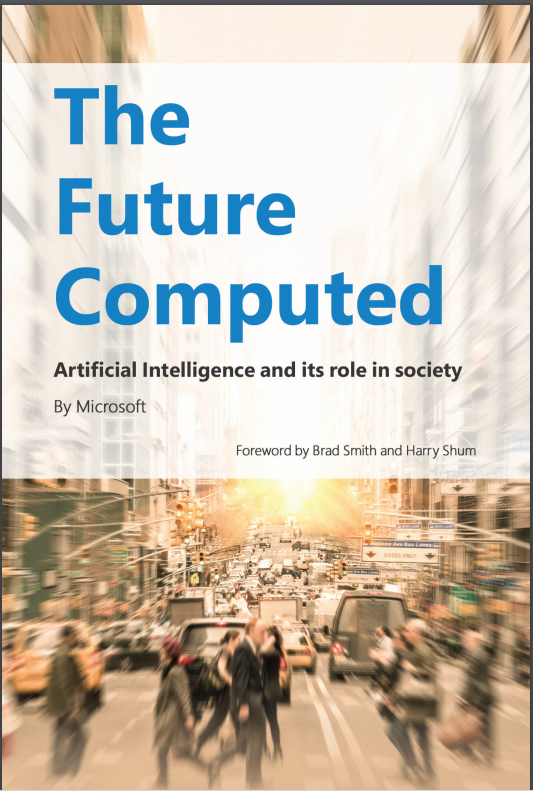
An official Microsoft Blog post speaks to the AI Future, Microsoft’s view. The post is a promotion for a book, “The Future Computed: Artificial Intelligence and its Role in Society,“ which is available for download (152 pages, free.) I have not had the chance to read it the book yet, so I will reserve judgement. However, the blog post contains a few paragraphs that summarize essential aspects of their view. I’ve quoted these below.
“First, the companies and countries that will fare best in the AI era will be those that embrace these changes rapidly and effectively. This is because new jobs and economic growth will come to those that embrace the technology, not those that resist or delay adopting it.
“Second, while we believe that AI will help solve big societal problems, we must look to this future with a critical eye. There will be challenges as well as opportunities. We must address the need for strong ethical principles, the evolution of laws, training for new skills and even labor market reforms. This must all come together if we’re going to make the most of AI.
“Third, we need to act with a sense of shared responsibility because AI won’t be created by the tech sector alone. At Microsoft we’re working to democratize AI in a manner that’s similar to how we made the PC available to everyone. This means we’re creating tools to make it easy for every developer, business and government to build AI-based solutions and accelerate the benefit to society.
“All of this leads us to what may be one of the most important conclusions of all. Skilling-up for an AI-powered world involves more than science, technology, engineering and math. As computers behave more like humans, the social sciences and humanities will become even more important. Languages, art, history, economics, ethics, philosophy, psychology and human development courses can teach critical, philosophical and ethics-based skills that will be instrumental in the development and management of AI solutions. If AI is to reach its potential in serving humans, then every engineer will need to learn more about the liberal arts and every liberal arts major will need to learn more about engineering.
“While we don’t have a crystal ball that shows us the future, we do know that we’re all going to need to spend more time listening to and learning from each other. We hope that The Future Computed can contribute to this conversation.”
This is in addition to industry efforts to set guidelines, principles, standards and such to address AI concerns. These include:
- IEEE’s vision and series of Ethics Standards (lists 120 issues and recommendations).
- The Future of Life Institute – Principles.
- The industry “Partnership on Artificial Intelligence to Benefit People and Society“
No doubt there are more out there. No matter how you feel about Microsoft or their products and the AI future, Microsoft’s view is a useful addition to our understanding of how one of the major players is approaching this cusp. As cited last week, and often on this site, we have passed a key tipping point.






 JOIN SSIT
JOIN SSIT